This is the newsletter version of Sara by the Season, where I explore what is piquing my curiosity as I try to lean into nature’s wisdom and rhythms. You can listen to me read you the newsletter by hitting play above - or you can click the little link above and to the right to play in your favorite podcast player. If you know someone who would like this sort of thing, I’d be so grateful if you would share it.
I was listening to Dr. Vandana Shiva on the For the Wild podcast a few weeks ago, and she said, “So part of what we have to transcend is the commodification of every aspect of our lives.” I stopped listening in the middle of the gym and wrote down the following in my notes app: We have to fight the commodification of every effing aspect of our lives.
I laughed when I went back to check the episode transcript at the difference between her actual words and my interpretation of them. You can tell that I’m a little worked up about said commodification, huh?
I’ve wrestled plenty here with social media over the years, and I don’t really want to rehash those old arguments. But Shiva’s words stopped me in my tracks because they are so true. The culture tells us that everything can be monetized - and because it can be monetized, it should be. If you’re good at putting on makeup, why not video yourself and use your expertise to get a commission off of the makeup products? Going through sorority rush? Why not share your fashion sense and maybe get a kickback from your favorite boutique? Have a big garden or like to cook? Why not make fancy videos and sell classes to people who want to learn how to garden or cook or sew or fill-in-the-blank? Read a lot of books? You should be on BookTok sharing your reviews in exchange for free copies. The commodification of FREAKING everything has even taken away our hobbies! The things we used to do for fun to escape the monotony and perfectionism of our jobs is now an opportunity for a side hustle, and we’re really missing out if we’re not taking advantage of that side income potential (especially in today’s economy, says the devil on my shoulder).
I have written a book about leaning into nature’s wisdom and rhythms, but every time I shop it to publishers and agents, I get feedback that my platform isn’t big enough (often among other more pointed critiques). The way I grow my platform is by making my writing a commodity. You feed the social media algorithms by making more Reels for Instagram, pithy quotes for Twitter1 or Threads or Notes2, setting your content to whatever song is trending on TikTok this week for maximum views. I don’t even know what I’m talking about because I get so exhausted anytime I even attempt to read any of this type of advice that I give up before I get too far into it. The most absurd part about all of this advice is that you’re not supposed to just make your art (in my case, writing) a commodity; you’re always encouraged to share more of yourself in these spaces, to be more “relatable.” So what they are really recommending is that you make your life the commodity.
We typically see the word “commodities” when someone is talking about the economy. According to Wikipedia, in economic terms, “a commodity is an economic good, usually a resource, that has full or substantial fungibility: that is, the market treats instances of the good as equivalent or nearly so with no regard to who produced them.” Economists like commodities because they are standardized, making them easy to compare no matter who is producing them. Of commodity-type products, Karl Marx famously said, "From the taste of wheat, it is not possible to tell who produced it, a Russian serf, a French peasant or an English capitalist." Commodities are things like wheat, corn, gold, and oil. It doesn’t matter if Shell or BP extracts and refines your oil, both end products will run your car (and hasten the climate catastrophe) regardless.
It should go without saying that art is about as far from a commodity as one can get. Art’s value is subjective. A poem can have tremendous value to me and not make any sense to you. A song can bring you to tears and annoy me. A painting could garner millions at auction and leave me indifferent. Art’s subjectivity is part of what makes it so beautiful and necessary. In a sea of commodities, we hunger for the authentic and particular.
In other words, we don’t want to turn the creative aspects of our lives into commodities, and we certainly don’t want to commodify our actual lives. I think the consequences of doing so are playing out in front of us in real time: multiple mental health crises, loneliness epidemic, mass shootings every day, a planet on fire driven primarily by our consumption.
Sometimes when I’m in a boring meeting, I do this thing where I write out my “ideal day.” I don’t know why I started doing this, but I probably have hundreds of pieces of paper (mostly recycled at this point) with my ideal day broken into blocks of time. I think I keep doing this thinking that someday I’ll arrive at not so much an ideal day as an optimized one.
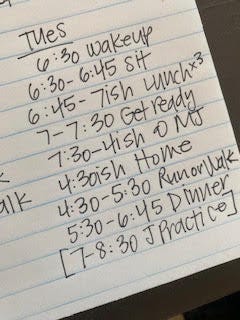
When I heard Shiva say (to my ears) that we have to fight the commodification of every effing aspect of our lives, I thought of my scraps of paper with my days laid out so perfectly on them. I’m habitually trying to commodify my life, so that my life looks like it “should.” I have to maximize every fifteen-minute block of my existence because, if not, I’m somehow wasting it.3
But you know what’s not on my “ideal day” scraps of paper? Time for snuggling with our oldest when he asks me to, (and nearly every time lately, I say yes and wonder if this will be the last time he’ll ask). Time to ease into the day because I’ve actually gotten up when the alarm went off seven times in my entire life, so not sure who this version of Sara is that is magically going to pop up at 6:30am for her meditation practice suddenly after nearly 40 years of pressing snooze. On my optimized day, there is no margin for someone to come home cranky and tired after work and/or school, to help Maeve study for her test because she likes it better when I quiz her, for watching the sunset, for snuggling on the couch for just one more episode, for sex, for a few more pages in my book before bed.
There is this ideal out there that Shiva is getting at, in which we’re trying to maximize every aspect of our lives. If we have a hobby, we think it needs to be turned into a side hustle. If we have a meditation or prayer practice, we think it needs to be longer or better in some way. If we go to the gym regularly, we think we should go more frequently or be more efficient. If we’re parents, there are a million things we think we should be doing that we’re not - or things we are doing that we think we shouldn’t. We’re judging ourselves constantly about how we could be better, faster, more successful, more productive, and we’re missing out on all of the life right here, right now.
In response to the commodification of every aspect of our lives, Shiva goes on to say:
Let us shift our minds to regenerating the currencies that make our life work, and the currencies that come from nature as the original source. These are the currencies of food currencies, of water currencies, of bread, currencies of love, relationship, currencies of being cared for, and the capacity to care. Now, once you do that, then instead of looking towards the market, or the financial sources, you start to turn to nature and to each other to say, what is it that we can do with this amazing body…And as bodily beings, we have needs of food, water, air, but as bodily beings, we have creativity of the most amazing kind, I think we'll have to reclaim our capacity to work physically. And for that we have to turn to Indigenous people, because they are the people who created abundance and wealth before the fossil fuel age before the age of capitalism.
I would ask it differently: What are the elements of living that not just make your life work, but help you to feel present to it? What are the pieces of your life that feel the most expansive, that generate the most joy, that make you feel most like yourself?
In this beautiful conversation, Rainn Wilson and Kelly Corrigan toy with the idea of creating a different kind of game of Life (the board game). In the original game, basically, the person with the most toys and accolades at the end, wins4. Wilson wonders what might happen instead if we redesigned the game of Life, so that the person who wins is the person who has gained the most spiritual qualities - he asks if the criteria for winning might be, “has life made you more wise, more kind, more compassionate, or has life stripped those [qualities] out of your heart?”
When we’re worried about maximizing or optimizing our work, our health, our influence, our lives, there isn’t much room for those things that not only Wilson’s alternative game of Life rewards, but that all of our great wisdom traditions talk about as the highest path. Because we’re commodifying every freaking aspect of our lives, we’re leaving ourselves little room for the actual deep and meaningful stuff that makes life worth living.
Scattering Seeds
I’m always finding stuff that supports the thesis of the book I’m writing on the benefits of leaning into nature’s wisdom, as well as other things related to this newsletter’s topic that maybe didn’t fit into the actual newsletter, so I thought I could start sharing those links and things here with all of you in hopes of some of the seeds I share germinating into something beautiful at your place.
I don’t know of a better way to get out of the optimization mindset than getting outside. A few years ago, I did a September nature challenge, where I challenged myself to get outside more, and I wrote up a post with tricks and tips that helped me to get out more.
Another aspect of the commodification of everything that I didn’t really get into above is how it creates SO MANY choices for us as consumers too and how exhausting all of the choices become. Anne Helen discusses some of the pitfalls that are especially relatable to us millennials and Gen Xers and James Richardson talks about it a bit more broadly here, which includes two tables comparing our choices in 1920 to 1970 that I can’t stop thinking about.
With the fall equinox approaching, it might be time for some grounding to settle and prepare so that we can more fully embrace the more inward seasons of fall and winter to come.
The commodification of everything has become as American as apple pie, which means it’s the water we’re swimming in, which means you have to find ways to see the water for what it is. You need to find practices that work for you to experience what it’s like to be a human being instead of a human doing, as Richard Rohr says. My favorites are yin yoga, free journaling, cloud gazing, walking the dog, and sitting, which is what I call my meditation practice instead of calling it a meditation practice because then it tells my brain that there is nothing to do or achieve, but just to sit. What are yours?
Cheers to finding some ways to not maximize or optimize or commodify in the week ahead!
Sara
Never calling it X.
Chats? I don’t even know the lingo. It’s too much.
Yes, I know I have control issues, and yes, I’ve brought it up in therapy.
Why did we ever think this was a good idea?!

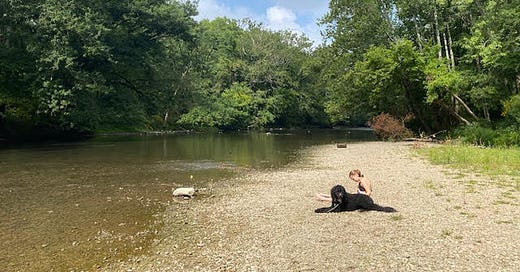




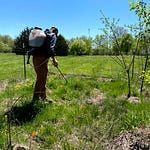
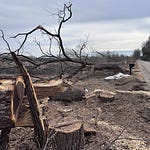



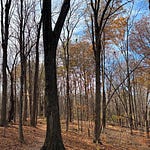


Share this post